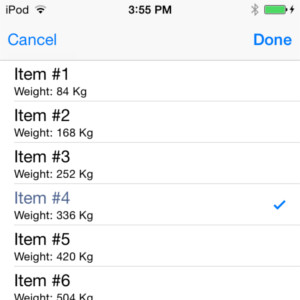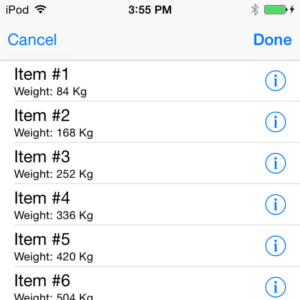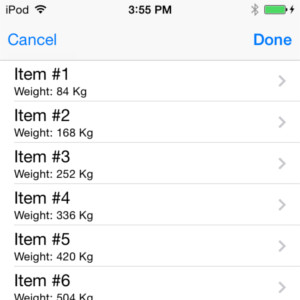On iOS devices, table views can be configured to use specific row decorations.
The ACCESSORYTYPE attribute
On iOS devices, the ACCESSORYTYPE attribute used in the DISPLAY ARRAY dialog ATTRIBUTES clause defines the type of icon that appears at the right side of each row.
- CHECKMARK
- DETAILBUTTON
- DISCLOSUREINDICATOR
For more details about the ATTRIBUTES syntax, see Syntax of DISPLAY ARRAY instruction.
Checkmark
When using ACCESSORYTYPE=CHECKMARK, the current row gets a check mark icon on the right hand side.
This decoration is typically used to get a visual indicator for the current row, so the user knows what row will be selected when the DISPLAY ARRAY dialog is validated with an accept (Done) action:
DISPLAY ARRAY arr TO sr.*
ATTRIBUTES( ACCESSORYTYPE=CHECKMARK )
...

Figure 1. iOS list view with checkmark
To customize the application, define the color of the checkmark with the iosTintColor Window-class style attribute.
Detail button
When using ACCESSORYTYPE=DETAILBUTTON, each row gets a (i) icon on the right-hand side.
To specify what action must be fired when the user taps on the (i) icon, define the DETAILACTION in the DISPLAY ARRAY attributes, and its corresponding ON ACTION handler.
By opening a new window when in the detail action code, a tap on the icon shifts the current window from right to left, to show the new screen.
When tapping on another part of a row, by default, the row becomes then new current row. To follow typical iOS standards, you should also define a DOUBLECLICK with its corresponding ON ACTION handler, to handle current row selection with a dedicated action. If tapping on any part of a row should open a detail form, use the DISCLOSUREINDICATOR solution instead of DETAILBUTTON.
When selecting a different row, the AFTER ROW / BEFORE ROW control blocks are executed before the detail action or double-click action.DISPLAY ARRAY arr TO sr.*
ATTRIBUTES( ACCESSORYTYPE=DETAILBUTTON,
DETAILACTION=edit_details,
DOUBLECLICK=select_row )
...
ON ACTION edit_details
OPEN WINDOW w_details WITH FORM "details"
INPUT BY NAME arr[i].*
...
END INPUT
CLOSE WINDOW w_details
ON ACTION select_row
...

Figure 2. iOS list view with detail button
To customize the application, define the color of the disclosure indicator with the iosTintColor Window-class style attribute.
Disclosure indicator
When using ACCESSORYTYPE=DISCLOSUREINDICATOR, each row gets a > gray chevron at the right of each row. This decoration is typically used when tapping the button brings up a list of more choices related to the current row, or to open a detail form to modify the list element.
To execute code when a tapping on a row, define the DOUBLECLICK attribute and its corresponding ON ACTION handler.
By opening a new window when in the detail action code, a tap on a row shifts the current window from right to left, to show the new screen.
When selecting a different row, the AFTER ROW / BEFORE ROW control blocks are executed before the double-click action.DISPLAY ARRAY arr TO sr.*
ATTRIBUTES( ACCESSORYTYPE=DISCLOSUREINDICATOR,
DOUBLECLICK=row_select )
...
ON ACTION row_select
MENU "Options" ATTRIBUTES(STYLE="dialog")
COMMAND "Refresh"
...
COMMAND "Duplicate"
...
COMMAND "Compress"
...
COMMAND "Refresh"
...
COMMAND "Synchronize"
...
END MENU
...

Figure 3. iOS list view with disclosure indicator